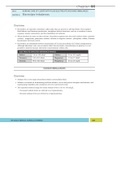Causes of hyponatremi Study guides, Class notes & Summaries
Looking for the best study guides, study notes and summaries about Causes of hyponatremi? On this page you'll find 3 study documents about Causes of hyponatremi.
All 3 results
Sort by

-
Nursing 172 Fluid & Electrolytes Exam | Questions & 100% Correct Answers (Verified) | Latest Update | Grade A+
- Exam (elaborations) • 9 pages • 2024
-
- $9.99
- + learn more
normal bicarbonate levels : 22-26 mEq/L normal chloride levels : 96-106 mEq/L normal phosphate levels : 2.4-4.4 mg/dL normal potassium levels : 3.5-5.0 mEq/L normal magnesium levels : 1.5-2.5 mEq/L normal sodium levels : 135-145 mEq/L 2 | P a g e normal calcium levels (total) : 8.6-10.2 mg/dL normal calcium levels (ionized) : 4.6-5.3 mg/dL Hypernatremia : Elevated serum sodium levels Clinical manifestations of hypernatremia : Restlessness, agitation, intense thirst Causes o...

-
Med Surg 2 Exam 4 Questions And Answers | Actual Exam Latest Updated 2024/2025 | 100% Correct
- Exam (elaborations) • 159 pages • 2024
-
- $15.49
- + learn more
An older male patient states that he is having problems starting and stopping his stream of urine and he feels the urgency to void. The best way to assist this patient is to: A) Help him stand to void. B) Place a condom catheter. C) Have him practice Credé's method. D) Initiate Kegel exercises. - ANSWER-Initiate Kegel exercises. Since removal of the patient's Foley catheter, the patient has voided 50 to 100 mL every 2 to 3 hours. Which action should the nurse take first? A) Check for ...

-
ATI Electrolyte Imbalances
- Exam (elaborations) • 27 pages • 2022
-
- $10.49
- + learn more
UNIT 6 NURSING CARE OF CLIENTS WITH FLUID/ELECTROLYTE/ACID-BASE IMBALANCES CHAPTER 44 Electrolyte Imbalances Overview ● Electrolytes are minerals (sometimes called salts) that are present in all body fluids. They regulate fluid balance and hormone production, strengthen skeletal structures, and act as catalysts in nerve response, muscle contraction, and the metabolism of nutrients. ● When dissolved in water or other solvent, electrolytes separate into ions and conduct either a positive...

How did he do that? By selling his study resources on Stuvia. Try it yourself! Discover all about earning on Stuvia


